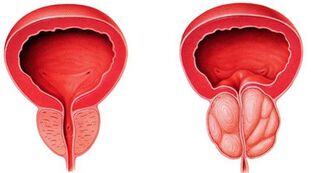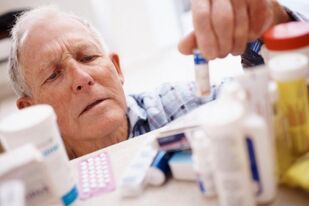Prostatitis and its treatment are one of the most painful topics in men suffering from this disorder. Treatment of prostatitis, according to experts, is a process consisting of many completely different procedures: physiotherapy, medication, massage. Only a global impact on the problem can help eliminate the unpleasant symptoms and, most importantly, the cause of the disease. The main role in this is assigned to drugs in the form of tablets, injections and suppositories.

Medicines for the treatment of prostatitis are selected by the attending physician. The set of means depends on the form of the patient's disease. In addition, an important role is played by the type of infection that caused the inflammation of the prostate. All doctors pay attention to these two factors in the first place. What else can influence the choice of drugs? We will talk about it a little later. But first, let's try to figure out what problems men with prostatitis have and what they face.
How to understand that this is prostatitis?
Treatment of prostatitis cannot begin without complaints from the patient. What signs may indicate that a man is sick with it? Experts agree that the initial stage of the disease may not manifest itself at all. Weakness and fatigue, which appear early in the disease, are often mistaken by men for ordinary fatigue, vitamin deficiency and stress. And only when the inflammation covers the entire prostate, can they notice pain above the pubis, radiating into the rectum, difficulty urinating and a constant urge to use the toilet. It is with such complaints that patients most often go to polyclinics. At this stage of the development of the disease, the treatment of prostatitis with pills gives a good result. The risk of it becoming chronic is minimal.
However, about 25% of men with symptoms of prostatitis are in no hurry to visit a doctor and endure. In this case the complaints are much more serious. In addition to constant pulling pains, men complain of decreased potency, lack of erection or too rapid ejaculation. In the urine of such patients, fibers, flakes and blood inclusions are visually observed. Treatment of prostatitis at this stage is a very complex process.

It is almost impossible to cope with the disease with pills alone. Additionally, the risk of complications, such as calcareous prostatitis, increases significantly.
Prostatitis reasons
What can cause prostatitis in men? Treatment (medication) begins by raising this question. After all, it is precisely the diagnosis that is made that helps to choose the right drugs for each case. Young men most often become victims of prostatitis, which developed as a result of genital infections that they suffered: herpes, candidiasis, chlamydia, cytomegalovirus, trichomoniasis, etc. Also, inflammation of the prostate gland develops due to regular hypothermia or congestion in the small pelvis due to a sedentary lifestyle.
In mature men, prostatitis most often appears due to inflammatory diseases of internal organs, stress, purulent inflammatory processes on the skin, as well as after the flu or other viral infections.
Elderly patients begin to suffer from prostatitis due to prolonged sexual abstinence. Also, a decrease in immunity and chronic inflammatory processes of internal organs can be the cause of their disease.
Based on these statistics, as well as laboratory and instrumental studies, the doctor selects drugs for the treatment of prostatitis.
Method of treatment
There are several important aspects in the medical treatment of the disease. All of them are aimed at restoring prostate tissue, eliminating inflammation and fighting the microorganisms that caused the disease. Symptomatic treatment of prostatitis in men is also of great importance. Medicines in this case relieve pain and spasms.
The elimination of symptoms is not the most important thing in the treatment of inflammation of the prostate. Antimicrobial and antiviral drugs for the treatment of prostatitis are much more important. Their choice is made based on the results of laboratory tests. In this case, not only the type of pathogen is taken into account, but also the sensitivity of the patient's body to medicines.
What else is needed to eliminate prostatitis in men? Treatment (drug) necessarily includes taking drugs that restore the immune state. This allows the patient's body to resist infection on its own. Also, attention is paid to restoring power (if there are problems with it).
Treatment methods such as prostate massage, herbal medicine and special nutrition also contribute to the restoration of prostate function.
Types and forms of drugs for prostatitis
So, we found out which treatment methods are considered the most effective today. Since drugs for the treatment of prostatitis are considered the main measure for combating the disease, it is worth considering in more detail which forms are used most often:
- Antibiotics and antiviral drugs - in the form of tablets, rectal suppositories and injections.
- Alpha 1-blockers - in the form of tablets or capsules.
- Hormonal preparations for the treatment of prostatitis and prostate adenoma - in the form of tablets.
- 5-alpha reductase inhibitors - tablets or capsules.
- Phytopreparations - in the form of tablets, capsules with powder filling or dragees.
- Non-steroidal anti-inflammatory drugs - in the form of tablets or solution for injection.
The attending physician, after a complete examination of the patient, decides how the treatment of prostatitis will be carried out: with pills, injections and / or suppositories.

What drugs are used most often when a man is diagnosed with inflammation of the prostate gland? The names of many drugs mean nothing to most patients, and some advertisements mention 2-3 remedies that can help in the fight against prostatitis. Next, we will consider each group of drugs for this ailment in more detail.
Anti-inflammatory drugs (NSAIDs)
Prostatitis medicines in this group are designed to relieve pain and inflammation. They can also lower the body temperature in acute prostatitis. The most suitable drugs are:
- Rectal suppositories and injections of diclofenac sodium.
- Ketorolac trometamol tablets and solution for injection.
Both of these drugs have contraindications. Basically, their intake is reflected in the digestive system of patients, therefore, in most cases, the treatment regimen is a three-day course with a weekly interval between them. But the drug "Ketorolac" is recommended for single use for pain of high intensity.
Antibiotics and antiviral drugs for prostatitis
Antibiotics and antiviralis are completely new drugs for the treatment of prostatitis. The fact is that penicillin and similar substances are not able to sufficiently penetrate the barrier of the prostate and accumulate in the tissues of the gland. Therefore, long-known antibiotics are not sufficiently effective. What drugs can be taken for prostate inflammation? Here is a list:
- Tablets and injections that belong to the protected subgroup of amoxicillins and are effective in acute and chronic prostatitis.
- Solutions for injection Cefotaxime, Ceftazidim or Ceftriaxone. While highly effective, these antibiotics have virtually no side effects.
- Tablets and injections Azithromycin and Josamycin, related to macrolides. With their help, you can fight microorganisms inside the cells of the diseased organ, that is, the prostate.
- Norfloxacin, ofloxacin or ciprofloxacin tablets and capsules. In addition to the antimicrobial action, they produce an immunomodulatory effect.
- Ciprofloxacin and aciclovir tablets are prescribed for patients who have a viral infection as the cause of inflammation of the prostate.

So, we have listed the main drugs used to treat prostatitis in men. Medicines should be selected and prescribed only by a specialist!
Preparations to increase immunity
Any inflammatory process, including prostatitis, occurs against a background of reduced immunity. This is why it is important to take immunomodulators. The most effective for prostatitis are:
- tablets of interferon alpha and taktivin, which protect against foreign microorganisms;
- T lymphocyte stimulator Levamisole;
- tablets containing sodium nucleinate, which increase the activity of macrophage cells;
- methyluracil drugs and dried juice of the herb Echinacea purpurea, stimulating cellular immunity.
All of the above drugs are prescribed by the attending physician. It also calculates the required dosage and duration of taking the funds. It is not recommended to take them yourself!
Herbal remedies for prostatitis
Despite the abundance of synthetic drugs, the treatment of prostatitis takes less time with the regular intake of special herbal remedies.
Means to normalize urination
Drugs in this group are mainly used for chronic prostatitis. It is this form of the disease that implies problems with urination. As a rule, alpha-1-blockers help relieve swelling of the prostate tissue.
The most popular remedies for prostatitis
Currently, doctors who specialize in the treatment of male diseases, including prostatitis, prefer to prescribe complex drugs to patients that combine several properties at once. For example, prostate extract injection solution is effective in acute and chronic prostatitis. Its use helps to activate the immune system, strengthen the vascular and cell walls of the prostate. As a result of therapy with the use of this remedy, blood circulation in the pelvic organs is normalized, the restoration of prostate tissues occurs several times faster. Also, drugs are often used to treat chronic prostatitis in the form of rectal suppositories.
Should I take hormones for prostatitis?
Hormonal preparations are not used for prostatitis in acute and chronic forms. The only condition in which a doctor can prescribe hormone-containing drugs is the presence of a benign or malignant tumor in the prostate gland.
In conclusion, I would like to remind readers once again that all drugs mentioned in this article are prescribed by the attending physician. Self-administration of drugs can lead to unpredictable consequences.

























